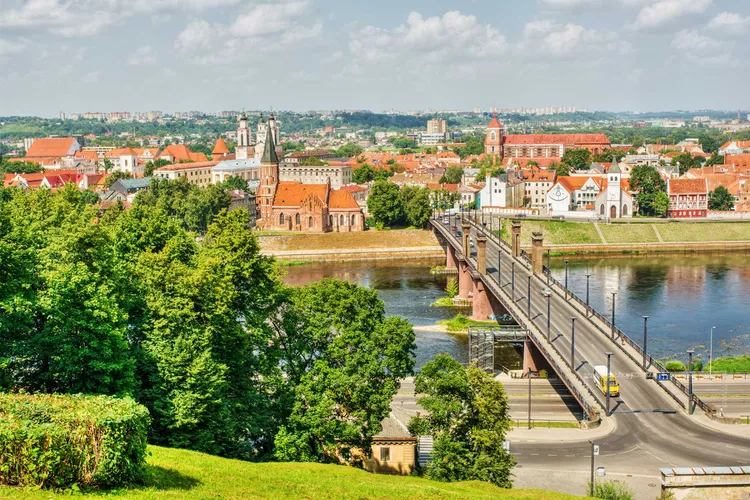When Lithuania’s capital was seized by Poland in 1919, the Baltic nation appointed a small central city as its new political seat. During its 20 years in this role — Vilnius was reclaimed in 1939 — the once-industrial Kaunas earned the nickname “Little Paris” and witnessed the construction of approximately 10,000 new public and private buildings. Consequently, this development led to an unmatched concentration of showcase modern architecture, alongside the Gothic, Baroque, and Byzantine Revival treasures of prior eras.
Today, Kaunas boasts over 6,000 standing examples of interwar Modernism, making it a fascinating destination for architecture enthusiasts. Moreover, the city is projected to join UNESCO’s World Heritage List soon and was named a European Capital of Culture for 2022. This honor reflects its distinctive architectural heritage.
A Baroque Retreat
:max_bytes(150000):strip_icc():format(webp)/monte-pacis-hotel-and-restaurant-KAUNAS0322-303b6616350e4e87bdd8665585752036.jpg)
The Pažaislis Church & Monastery dazzles with its late-Baroque style, with construction beginning in 1662. It recently served as a backdrop in HBO’s Catherine the Great. Visitors can tour the grounds of the Camaldolese hermitage, which features a hexagonal, Venetian-inspired church adorned with frescoes by Florentine painter Mykolas Arkangelas Palonis. Moreover, the 17th-century guesthouse has been transformed into Monte Pacis (doubles from $74) — a boutique hotel showcasing elegant suites and a fine-dining restaurant (entrées $14–$34), cherished for its selection of Lithuanian wines.
An Interwar Icon
:max_bytes(150000):strip_icc():format(webp)/mk-clurilonis-museum-of-art-KAUNAS0322-3ab395b5965341cfa24533ff032931ab.jpg)
The simple yet grand M. K. Čiurlionis National Museum of Art epitomizes Kaunas Modernism. Designed in 1930 by architects Vladimiras Dubeneckis, Kārlis Reisons, and Kazimieras Kričiukaitis, the striking crown-shaped front entrance pays homage to artist M. K. Čiurlionis, a prominent figure whose works are central to the museum’s collection. Additionally, the museum will commemorate its Capital of Culture status through a special exhibition titled That Which We Do Not Remember (running through November 30) by South African artist William Kentridge, who has Lithuanian-Jewish heritage linked to Kaunas.
A Contemporary Hub
:max_bytes(150000):strip_icc():format(webp)/science-island-kaunas-rendering-KAUNAS0322-9e5cbd5f80d04bb4ae115349ad4ab3f1.jpg)
The $28 million National Science & Innovation Center, known as Science Island, offers a glimpse into Kaunas’s architectural future. Designed by SMAR Architecture Studio, the sleek, low-slung structure harmonizes with the natural landscape of Nemunas Island: its glass walls provide views of an 82-acre park and the copper roofs of Old Town across the river. Furthermore, upon its opening later this year, the center will demonstrate how sustainability and technology can coexist.
A version of this story first appeared in the March 2022 issue of iBestTravel under the headline Baltic Beauty.




